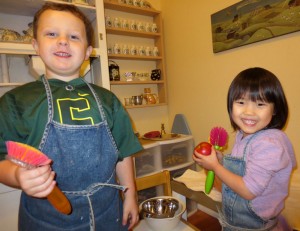 The Core Elements of Little Fruit Farm’s Program:
The Core Elements of Little Fruit Farm’s Program:
- Practical life
- Grace and Courtesy
- Sensorial
- Language
- Language Extensions
- Mathematics
Practical Life
Montessori students love doing routine activities related to the home. On any given day at LFFM, you may see children tending the gardens, feeding the birds, squirrels or worms, baking biscuits or participating in making jam. Other students may be washing cloths, scrubbing a table or concentrating on tying a friend’s shoe. Real life, real objects and purposeful work using the hands are classic components in a Montessori classroom.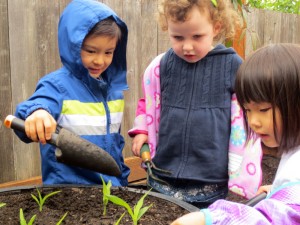
Practical Life helps students increase concentration, repetition, control of movement, gross and fine motor development, eye and hand coordination and memory for order. These skills transfer beautifully to more advanced work in other areas of the classroom.
Grace and Courtesy
One of the most striking attributes and vital life skills Montessori students acquire is the ability to play and work peacefully and harmoniously together. Lessons in kindness and courtesy help children learn how to accept and take responsibility for other people. As students become more independent, finding peaceful resolutions to challenging situations become second nature. Students gain increased levels of self-confidence, self-esteem, and responsibility for self and others.
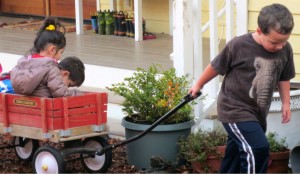 Sensorial
Sensorial
The Sensorial area is composed of scientific Montessori materials providing opportunities for students to gain knowledge of their world through their senses. Each specialized material isolates a particular quality such as color, size, weight, texture, pitch, smell, sound or taste. Physical interaction, exploration, discovery, creativity, imagination, knowledge and awareness are only some of the words to describe what’s happening when a child is working in the Sensorial area. Many of the materials are designed with open ended application adding intrigue and excitement. Repeatedly drawn, enthusiastically engaged, lively and entertaining, children shine brilliantly using their imagination to create new ways of doing things. Without exception Dr. Maria Montessori gave a gift of her genius introducing children to these wonderful scientifically created materials as “keys to the universe.”
 Sensorial materials help students with greater refinement of the hand for writing, increased levels of repetition, concentration and heightened awareness. Students gain further development of the mathematical mind mastering basic concepts in order, sequencing, precision, dimension, the decimal system, the metric system and the power of a cube. Additionally, students are sharpening their awareness skills in classification, gradation, matching, sorting and memory.
Sensorial materials help students with greater refinement of the hand for writing, increased levels of repetition, concentration and heightened awareness. Students gain further development of the mathematical mind mastering basic concepts in order, sequencing, precision, dimension, the decimal system, the metric system and the power of a cube. Additionally, students are sharpening their awareness skills in classification, gradation, matching, sorting and memory.
Language
Stimulating and dynamic Montessori language activities address a child’s need to communicate, to be understood and to belong. Facilitated group discussions, storytelling, poetry, rhyming and presentations are fun ways students learn how to organize their thoughts and ideas. Group activities address social development initiating what it means to be in a group as a participator, a contributor, and a listener. Two effortless ways students learn to link sounds to symbol is through their love of tracing sandpaper letters with finger tips and playing the sound game, both heightening sensorial experiences. Enrichment of vocabulary, classification cards and labeling objects help students make sense of things while the moveable alphabet assists in writing before the hand is ready. By tracing metal inset shapes, children strengthen their hands and improve eye hand coordination. Students love creating beautiful and creative art work and in the process develop beautiful and lovely handwriting.
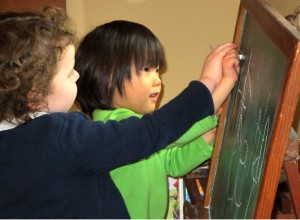 Language Extensions
Language Extensions
Geography, Biology, Botany, Zoology, Art and Music are integrated into the language curriculum. Cultural studies are explored through history and geography materials such as maps and land and water forms. Students learn to appreciate and admire cultures from around the world by experiencing presentations, doing projects and participating in celebrations. Lessons and activities in nature inspire respect for all living things. Scientific principles are explored and investigated through hands on activities integrating conceptual science with practical life skills both indoors and out. Planting seeds, caring for them and watching them grow adds excitement and a deeper connection and love for mother earth. Art and music are always accessible to children for creative expression as well as opportunities to learn and gain knowledge of all the great masters.
Mathematics
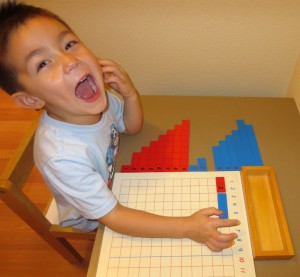 Montessori students have been acquiring important and necessary skills for success in mathematics through many activities in the classroom. Beginning in Practical Life, students are given opportunities to begin increasing levels of accuracy and concentration through modeling friendliness to error. Montessori students learn a “mistake” is just an opportunity to do something over again until they get it right. This in turn supports a child’s natural love to repeat and perfect skills. Students working with the sensorial materials have been laying down a mathematical foundation for later work with abstracts through orderly perceptions of classified and graded sensory experiences. Language teaches the vocabulary and helps with memory recognition and recall.
Montessori students have been acquiring important and necessary skills for success in mathematics through many activities in the classroom. Beginning in Practical Life, students are given opportunities to begin increasing levels of accuracy and concentration through modeling friendliness to error. Montessori students learn a “mistake” is just an opportunity to do something over again until they get it right. This in turn supports a child’s natural love to repeat and perfect skills. Students working with the sensorial materials have been laying down a mathematical foundation for later work with abstracts through orderly perceptions of classified and graded sensory experiences. Language teaches the vocabulary and helps with memory recognition and recall.
Montessori students use hands on mathematical materials helping to make abstract concepts more clear and concrete. This is the missing piece in conventional mathematical education and why most people find mathematical concepts difficult to grasp. Mathematics for a Montessori student can be fun and joyful because all the right conditions have been fostered.
The Mathematical area focuses on patterns including color coding, exercises ranging from simple to more complex, and new activities leading to addition, subtraction, multiplication and division. Activities include number work one through ten, operations of decimals, writing symbols, continuation of counting, tens, teens and number chains from one to a thousand.
